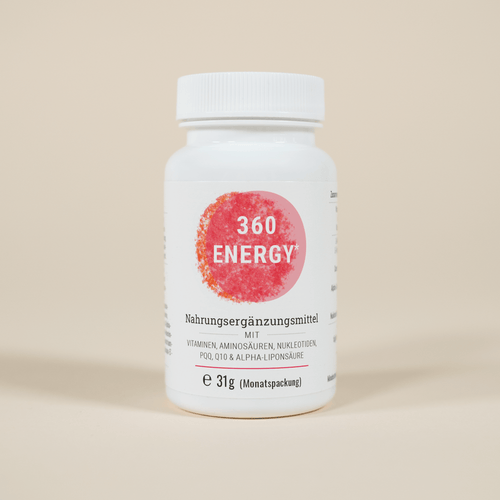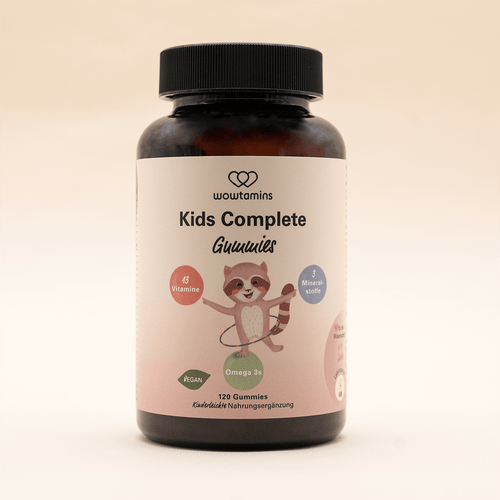

Knowledge blog > Micronutrient dictionary
Vitamin B6 (pyridoxine)
Themen dieses Blogartikels:
What is vitamin b6?
This vitamin is one of the water-soluble vitamins and is also called pyridoxine. On the back of food supplements, you should make sure that vitamin B6 is contained as pyridoxal-5-phosphate. This is active in the metabolism.1
What are the functions of vitamin b6?
Vitamin B6 is required, for example, as a cofactor in biochemical reactions in the body. Vitamin B6 is therefore important for the energy metabolism of cells and is absolutely essential for converting amino acids into each other. It also has antioxidant properties and is necessary for the nervous system and psychological functions.2
What makes vitamin b6 unique?
Only if vitamin B6 is present can amino acids be converted into each other and broken down or become neurotransmitters or products for energy metabolism. Vitamin B6 can regulate hormone activity due to its limited availability.3
How much vitamin b6 do you need per day?
The recommended vitamin B6 intake according to the German Nutrition Society (DGE) is as follows5:
| Age | Vitamin b6/day male | Vitamin b6/day female |
| Infants | ||
| 0 to under 4 months | 0,1 | 0,1 |
| 4 to under 12 months | 0,3 | 0,3 |
| Children and teenagers | ||
| 1 to under 4 years | 0,6 | 0,6 |
| 4 to under 7 years | 0,7 | 0,7 |
| 7 to under 10 years | 1,0 | 1,0 |
| 10 to under 13 years | 1,2 | 1,2 |
| 13 to under 15 years | 1,5 | 1,4 |
| 15 to under 19 years | 1,6 | 1,4 |
| Adults | ||
| 19 to under 25 years | 1,6 | 1,4 |
| 25 to under 51 years | 1,6 | 1,4 |
| 51 to under 65 years | 1,6 | 1,4 |
| 65 years and older | 1,6 | 1,4 |
| Pregnant women | ||
| 1st trimester | 1,5 | |
| 2nd & 3rd trimester | 1,8 | |
| Breastfeeding | 1,6 | |
When do you need vitamin b6 most?
Vitamin B6 is particularly important in phases of concentration and mental performance. Vitamin B6, together with iron and vitamin B12, can also be a reason for the lack of red blood cells in cases of anaemia.4
How does an vitamin b6 deficiency develop and how does it manifest itself?
A nutritional deficiency of vitamin B6 is rare, as this micronutrient is found in many foods6. However, alcohol abuse and the use of certain medications can increase the risk of developing a deficiency. For example, some anti-epileptic drugs and antibiotics can cause vitamin B6 stored in the body to be broken down. A deficiency can cause scaly skin rashes, numbness in the hands and feet and confusion, among other things.7
What happens if there is an overdose of vitamin b6?
The Federal Institute for Risk Assessment (BfR) recommends not exceeding the maximum amount of 5.4 mg of vitamin B6 per day. An overdose can lead to nerve function disorders.8
Which foods are particularly high in vitamin b6?
Vitamin B6 is found in offal, fatty fish, wholegrain products, nuts, seeds, bananas and potatoes.
Advertisement
Further blog articles on the topic
Combining and taking micronutrients correctly: The big guide
How do you combine micronutrients correctly and when should you take them?
Your ultimate cheat sheet: Micronutrient hacks for hectic days
What can you do if you're neglecting your healthy diet in your daily life? Our cheat list gives you 15 quick nutrient boosts to your well-being.
Vitamin Guide: Everything you need to know about vitamins
Are vitamins essential? Find out in our guide which vitamins are essential for you and when you should take them.
Vitamins for athletes: Which nutrients give you power?
Vitamin B1 (thiamine)
Vitamin B2 (riboflavin)
Vitamin B3 (niacin)
Vitamin B5 (pantothenic acid)
Vitamin B7 (biotin)
This dictionary entry is based on carefully researched sources:
Bibliography & Sources
- https://www.dge.de/forschung/referenzwerte/vitamin-b6/
- https://www.msdmanuals.com/de-de/heim/ern%C3%A4hrungsst%C3%B6rungen/vitamin/vitamin-b6-lack
- https://www.lgl.bayern.de/lebensmittel/warengruppen/wc_49_diaetische_lebensmittel/et_vitamin_b6_sportlerprodukte.htm
- https://www.gesundheit.gv.at/leben/ernaehrung/vitamine-mineralstoffe/wasserloesliche-vitamin/vitamin-b6.html

































